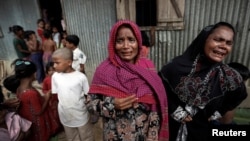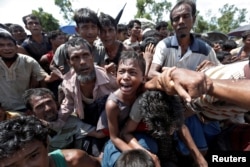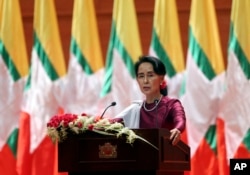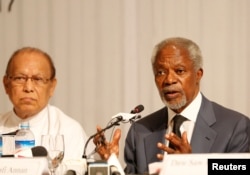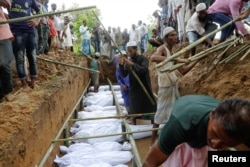U.N. Secretary-General António Guterres called Thursday for “swift action” to halt the deteriorating situation in Myanmar’s northern Rakhine State, where a half million mostly Rohingya Muslims have fled to neighboring Bangladesh in the past month.
“The situation has spiraled into the world’s fastest developing refugee emergency; a humanitarian and human rights nightmare,” Guterres told an open meeting of the U.N. Security Council.
The council has privately discussed the situation three times in the past month, but Thursday’s session was the first time since 2009 that it has publicly discussed Myanmar.
Guterres called for an end to the military’s operations; unhindered aid access; and the safe and voluntary return of refugees to their areas of origin.
“There seems to be a deeply disturbing pattern to the violence and ensuing large movements of an ethnic group from their homes,” Guterres said.
Guterres and his human rights commissioner have both expressed concerns that what is happening in Rakhine State is ethnic cleansing.
The secretary-general said the core problem is the prolonged statelessness of the Rohingya and its associated discrimination. “The Muslims of Rakhine State should be granted nationality,” Guterres said.
The Rohingya are one of many ethnic minorities in the Buddhist-majority nation. They are considered to be economic migrants from Bangladesh and have been denied citizenship, even though most can show that their families have been in the country for generations.
Dire situation in camps
The Red Crescent Society, which has mounted a $13 million appeal for the Rakhine refugee camps in Cox's Bazar in southern Bangladesh, warns the camps may be on the brink of a possible outbreak of disease.
"Our mobile clinics are treating more people, especially children, who are very sick from diarrheal diseases which are a direct result of the terrible sanitation conditions in the makeshift camps," said Mozharul Huq, Secretary General of the Bangladesh Red Crescent Society. "We are on the cusp of a serious health outbreak."
The Red Crescent says safe water, sanitation, hygiene promotion and medical care are "urgently needed" to prevent what would be a catastrophic development.
"In some camps, hundreds of people are sharing one toilet," said Martin Faller, deputy regional director for Asia Pacific for the International Federation of Red Cross and Red Crescent Societies. "The conditions for an outbreak of disease are all present - we have to act now ."
Violence erupted in Rakhine on August 25, after attacks by Rohingya militants on state security forces led to military reprisals.
U.S. ambassador Nikki Haley said the military response has been “disproportionate and indiscriminate” and has dwarfed the original rebel attacks in the scope of its violence. She called for a suspension of arms sales to the military until sufficient accountability measures are in place.
The military has been accused of the widespread burning of Rohingya villages, rape, killings, looting and the laying of landmines to prevent people returning to their homes.
“We cannot be afraid to call the actions of the Burmese authorities what they appear to be: a brutal, sustained campaign to cleanse the country of an ethnic minority,” Haley said, referring to Myanmar by its other name.
“And it should shame senior Burmese leaders who have sacrificed so much for an open, democratic Burma,” she said in an apparent reference to the country’s de facto leader Aung San Suu Kyi.
Suu Kyi criticism
Nobel Peace Prize laureate Aung San Suu Kyi has faced international criticism for remaining silent on the situation until last week.
Haley said the United States has provided $95 million in humanitarian aid to Myanmar and Bangladesh, but acknowledged it would not be enough for the growing emergency.
“As we speak, the situation on the ground is beginning to move toward stability,” China’s Deputy U.N. envoy Wu Haitao declared.
Russian ambassador Vassily Nebenzia discouraged “excessive pressure” on Myanmar’s authorities, which he said could only aggravate the situation. “We need to be very careful when we wield such notions as genocide and ethnic cleansing,” he added.
Most council members expressed their concern that the crisis could spill over into the region, causing broader instability and the potential radicalization of the disenfranchised. There was also broad consensus among members that the violence must stop, humanitarian agencies must be allowed in, and root causes of the conflict should be addressed.
Myanmar’s national security adviser, Thaung Tun, disputed that ethnic cleansing is taking place.
“I wish to stress there is no ethnic cleansing and no genocide in Myanmar,” he told council members. “Ethnic cleansing and genocide are serious charges and they should not be used lightly.”
He said the country is fighting terrorists, adding that no armed clashes or clearance operations have taken place since September 5th.
“Despite claims otherwise, violence has not ceased in northern Rakhine State, neither has the exodus of Rohingyas to Bangladesh,” that country’s U.N. ambassador Masud Bin Momen said. “Only last night an additional 20,000 entered into Bangladesh,” he noted.
The envoy said the situation is untenable and reiterated his prime minister’s call for U.N. supervised safe zones inside Myanmar for the Rohingya.
Advisory commission
Myanmar’s National Security Adviser also noted that his government views the recommendations of the Rakhine Advisory Commission as a “viable road map” forward.
The Commission was chaired by former U.N. chief Kofi Annan and had six local and three international experts. Members traveled extensively in Rakhine State during the past year and submitted their final report to the national authorities on August 23.
The commission’s recommendations include urging the government to provide full and unhindered humanitarian access; address the issue of citizenship, including reviewing the 1982 citizenship law; and guaranteeing freedom of movement for all people in Rakhine, irrespective of religion, ethnicity, or citizenship status.
French Ambassador Francois Delattre said that Kofi Annan has agreed to brief the council next month in an informal session.
Thursday’s Security Council session follows two high-level meetings on the sidelines of last week’s gathering of leaders at the U.N. General Assembly. The Organization of Islamic Cooperation (OIC) met at ministerial level to discuss the growing humanitarian crisis, and British Foreign Secretary Boris Johnson brought together his counterparts from several countries, including the United States. They called for an end to the military campaign.
The heads of U.N. agencies in Myanmar were due to visit Rakhine State on Thursday on a government-arranged trip, but it was postponed due to inclement weather conditions. The Myanmar National Security Adviser said the visit would go ahead on Monday. He also said the government has invited U.N. chief Guterres to visit the area.
Aid agencies have been unable to work in Rakhine since violence erupted last month, but they are working in Bangladesh, where the refugees are fleeing.
A boat carrying Rohingya refugees capsized there Thursday in the Bay of Bengal, killing at least nine children and five women.
The U.N. refugee agency said 27 women and children survived the accident, but it was not clear how many people were on the boat before it tipped over. The agency said there are unconfirmed reports that a second boat is missing.
Urgent action needed
The U.N. has appealed for $77 million to meet emergency needs of the refugees. It has received nearly half that amount, but will be calling for additional funds as the scale of the emergency has far surpassed initial projections.
On October 9, the U.N. Refugee agency, the humanitarian affairs office and the International Organization for Migration will convene a donor’s conference, the secretary-general said.
Myanmar has also reached out to the regional bloc ASEAN for humanitarian assistance.
Separately, a coalition of nearly 90 human rights groups called Thursday for the U.N. Security Council to consider measures including an arms embargo against Myanmar’s military and targeted financial sanctions against individuals responsible for crimes and serious abuses.
“As more evidence emerges, it is clear that the atrocities committed by Myanmar state security forces amount to crimes against humanity,” the coalition said. “The United Nations and its member states need to take urgent action,” their statement read.
“If governments, U.N. officials and diplomats simply hold meetings and make speeches as atrocities continue in Myanmar, they bear the risk of failing to use every diplomatic tool at their disposal to stop the ethnic cleansing campaign and further crimes against humanity,” the rights groups warned.




